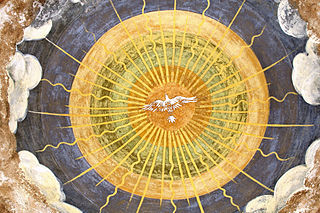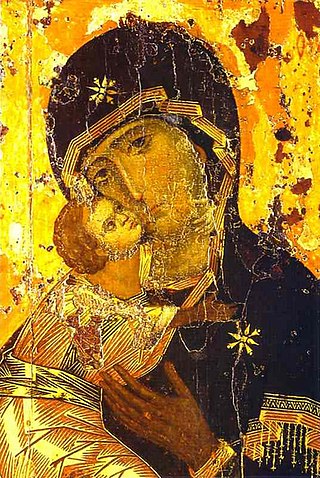Arianism is a Christological doctrine considered heretical by all mainstream branches of Christianity. It is first attributed to Arius, a Christian presbyter who preached and studied in Alexandria, Egypt. Arian theology holds that Jesus Christ is the Son of God, who was begotten by God the Father with the difference that the Son of God did not always exist but was begotten/made before time by God the Father; therefore, Jesus was not coeternal with God the Father, but nonetheless Jesus began to exist outside time.

A creed, also known as a confession of faith, a symbol, or a statement of faith, is a statement of the shared beliefs of a community in a form which is structured by subjects which summarize its core tenets.

In Christianity, Christology, translated from Greek as 'the study of Christ', is a branch of theology that concerns Jesus. Different denominations have different opinions on questions such as whether Jesus was human, divine, or both, and as a messiah what his role would be in the freeing of the Jewish people from foreign rulers or in the prophesied Kingdom of God, and in the salvation from what would otherwise be the consequences of sin.
Chalcedonian Christianity is a term referring to the branches of Christianity that accept and uphold theological resolutions of the Council of Chalcedon, the fourth ecumenical council, held in 451. Chalcedonian Christianity accepts the Christological Definition of Chalcedon, a Christian doctrine concerning the union of two natures in one hypostasis of Jesus Christ, who is thus acknowledged as a single person (prosopon). Chalcedonian Christianity also accepts the Chalcedonian confirmation of the Niceno-Constantinopolitan Creed, thus acknowledging the commitment of Chalcedonism to Nicene Christianity.
Restorationism, also known as Restitutionism or Christian primitivism, is a religious perspective according to which the early beliefs and practices of the followers of Jesus were either lost or adulterated after his death and required a "restoration". It is a view that often "seeks to correct faults or deficiencies by appealing to the primitive church as normative model".

Pneumatology refers to a particular discipline within Christian theology that focuses on the study of the Holy Spirit. The term is derived from the Greek word Pneuma, which designates "breath" or "spirit" and metaphorically describes a non-material being or influence. The English term pneumatology comes from two Greek words: πνεῦμα and λόγος. Pneumatology includes study of the person of the Holy Spirit, and the works of the Holy Spirit. This latter category also includes Christian teachings on new birth, spiritual gifts (charismata), Spirit-baptism, sanctification, the inspiration of prophets, and the indwelling of the Holy Trinity. Different Christian denominations have different theological approaches on various pneumatological questions.

In ecclesiology, the Christian Church is what different Christian denominations conceive of as being the true body of Christians or the original institution established by Jesus Christ. "Christian Church" has also been used in academia as a synonym for Christianity, despite the fact that it is composed of multiple churches or denominations, many of which hold a doctrinal claim of being the "one true church" to the exclusion of the others.
In Christian theology, ecclesiology is the study of the Church, the origins of Christianity, its relationship to Jesus, its role in salvation, its polity, its discipline, its eschatology, and its leadership.
Systematic theology, or systematics, is a discipline of Christian theology that formulates an orderly, rational, and coherent account of the doctrines of the Christian faith. It addresses issues such as what the Bible teaches about certain topics or what is true about God and his universe. It also builds on biblical disciplines, church history, as well as biblical and historical theology. Systematic theology shares its systematic tasks with other disciplines such as constructive theology, dogmatics, ethics, apologetics, and philosophy of religion.
Liberal Christianity, also known as liberal theology and historically as Christian Modernism, is a movement that interprets Christian teaching by taking into consideration modern knowledge, science and ethics. It emphasizes the importance of reason and experience over doctrinal authority. Liberal Christians view their theology as an alternative to both atheistic rationalism and theologies based on traditional interpretations of external authority, such as the Bible or sacred tradition.
The infallibility of the Church is the belief that the Holy Spirit preserves the Christian Church from errors that would contradict its essential doctrines. It is related to, but not the same as, indefectibility, that is, "she remains and will remain the Institution of Salvation, founded by Christ, until the end of the world." The doctrine of infallibility is premised on the authority Jesus granted to the apostles to "bind and loose" and in particular the promises to Peter in regard to papal infallibility.

In Christian theology, the doctrine of incarnation teaches that the pre-existent divine person of Jesus Christ, God the Son, the second person of the Trinity, and the eternally begotten Logos, took upon human nature and "was made flesh" by being conceived in the womb of a woman, the Virgin Mary, also known as the Theotokos. The doctrine of the incarnation then entails that Jesus was at the same time both fully God and fully human.

In Christianity, God is believed to be the eternal, supreme being who created and preserves all things. Most Christians believe in a monotheistic, trinitarian conception of God, which is both transcendent and immanent. Most Christians believe in a singular God that exists in a Trinity, which consists of three persons: God the Father, God the Son, and God the Holy Spirit. Christian teachings on the transcendence, immanence, and involvement of God in the world and his love for humanity exclude the belief that God is of the same substance as the created universe but accept that God the Son assumed hypostatically united human nature, thus becoming man in a unique event known as "the Incarnation".
The Four Marks of the Church, also known as the Attributes of the Church, describes four distinctive adjectives of traditional Christian ecclesiology as expressed in the Nicene Creed completed at the First Council of Constantinople in AD 381: "[We believe] in one, holy, catholic, and apostolic Church."
Gabriel Joseph Fackre (1926–2018) was an American theologian and Abbot Professor of Christian Theology Emeritus at Andover Newton Theological School in Newton, Massachusetts. He was on the school's faculty for 25 years before retiring in 1996. Previous to that he was Professor of Theology and Culture at Lancaster Theological Seminary in Pennsylvania, teaching there from 1961 through 1970. Fackre has also served as visiting professor or held lectureships at 40 universities, colleges, and seminaries. His papers are housed in Special Collections at Princeton Theological Seminary Libraries, Princeton, New Jersey.

Mariology is the theological study of Mary, the mother of Jesus. Mariology seeks to relate doctrine or dogma about Mary to other doctrines of the faith, such as those concerning Jesus and notions about redemption, intercession and grace. Christian Mariology aims to place the role of the historic Mary in the context of scripture, tradition and the teachings of the Church on Mary. In terms of social history, Mariology may be broadly defined as the study of devotion to and thinking about Mary throughout the history of Christianity.

The following outline is provided as an overview of and topical guide to Christianity:

The pre-existence of Christ asserts the existence of Christ prior to his incarnation as Jesus. One of the relevant Bible passages is John 1:1–18 where, in the Trinitarian interpretation, Christ is identified with a pre-existent divine hypostasis called the Logos. There are nontrinitarian views that question the aspect of personal pre-existence, the aspect of divinity, or both.
The following outline is provided as an overview of, and topical guide to, theology.
Christian theology is the theology – the systematic study of the divine and religion – of Christianity and Christian belief and practice. It concentrates primarily upon the texts of the Old Testament and of the New Testament, as well as on Christian tradition. Christian theologians use biblical exegesis, rational analysis and argument. Theologians may undertake the study of Christian theology for a variety of reasons, such as in order to:








